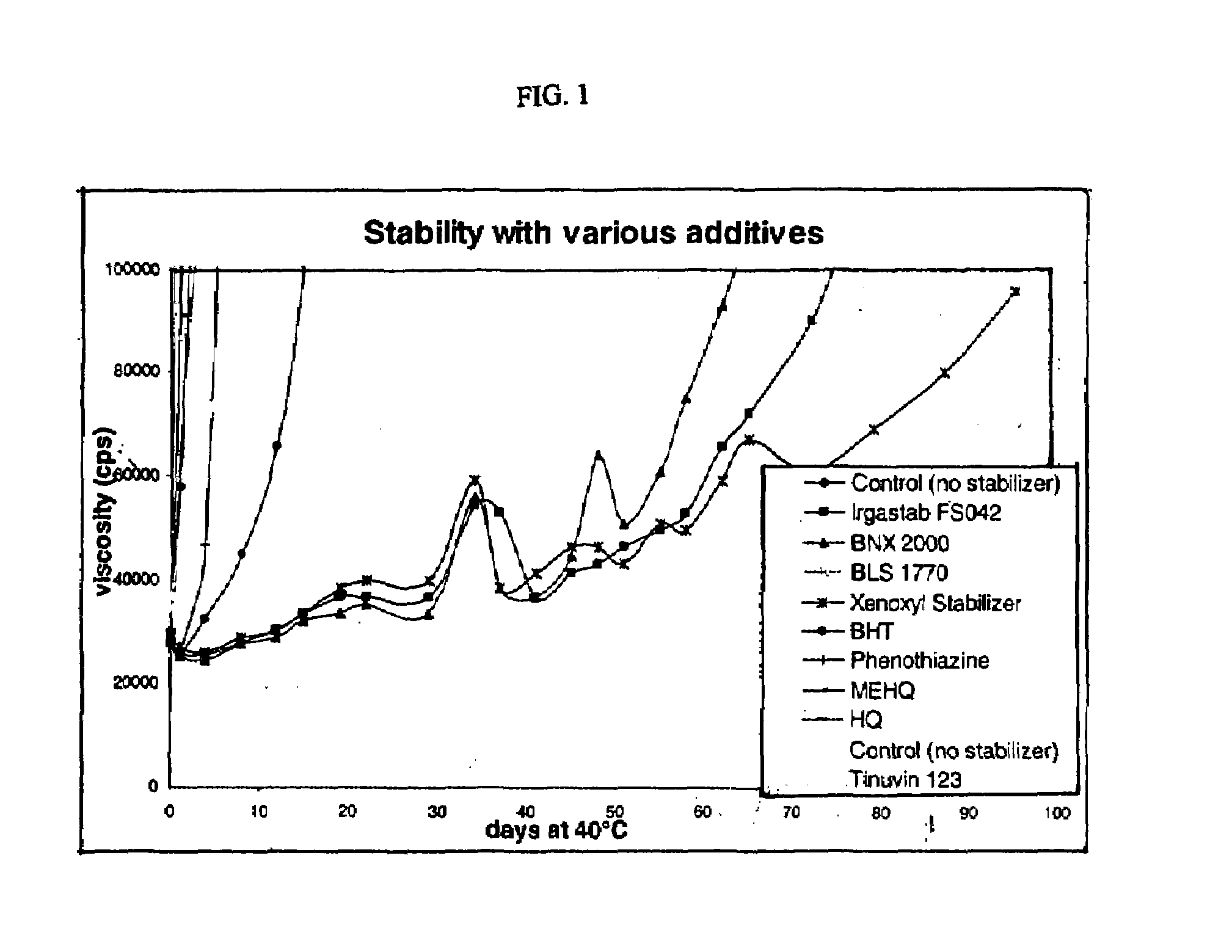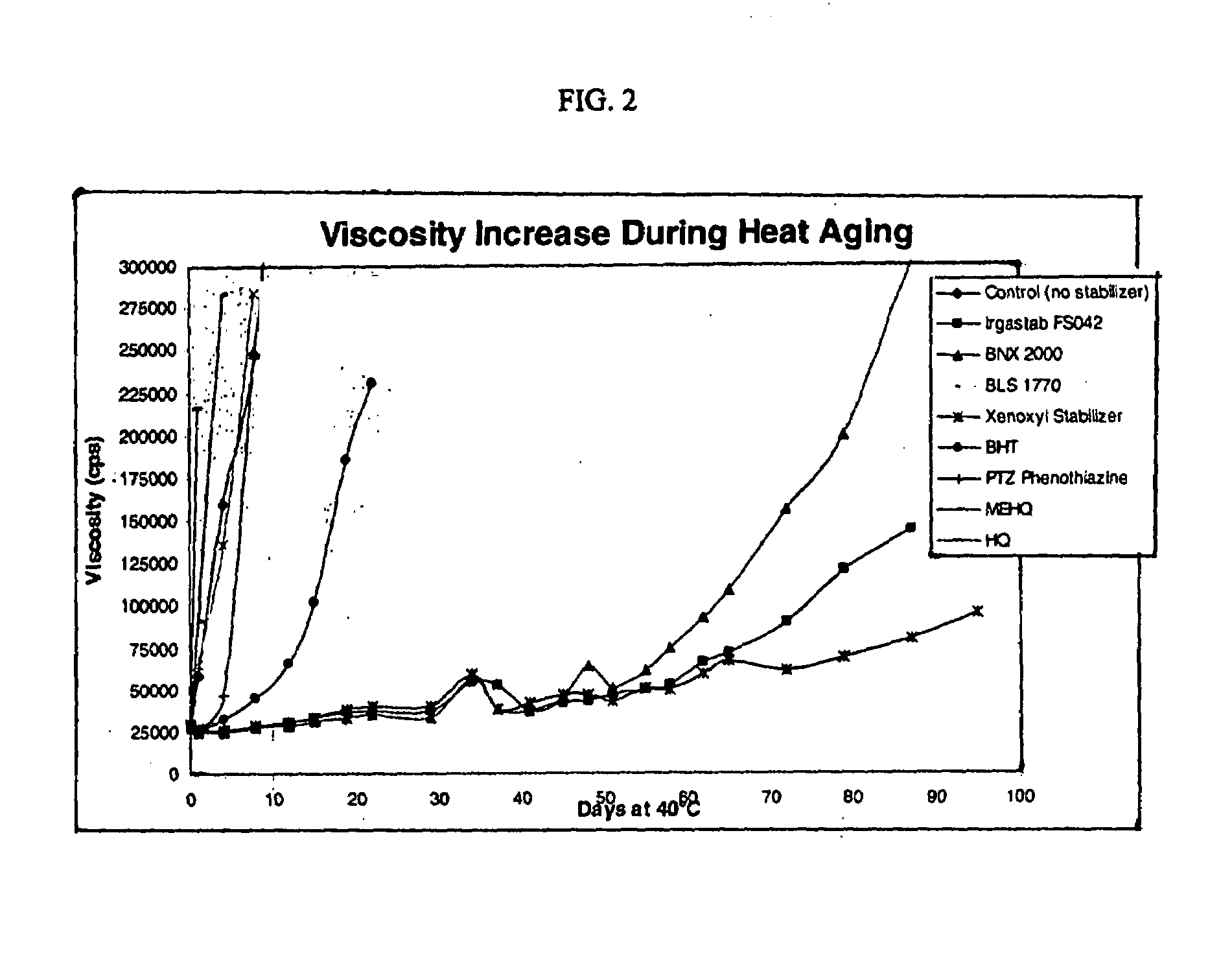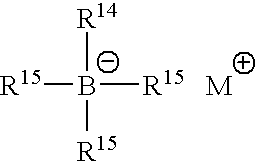Stabilized organoborane polymerization initiators and polymerizable compositions
a polymerization initiator and organoborane technology, applied in the direction of catalyst activation/preparation, physical/chemical process catalysts, chemical/physical processes, etc., can solve the problems of difficult to find adhesive compositions that bond to these materials, commercially available adhesives used for these plastics require time-consuming or extensive pretreatment of the surface, and significant limitations for automobile components, toys, furniture and the like. , to achieve the effect of excellent adhesion and adhesive strength, good bond
- Summary
- Abstract
- Description
- Claims
- Application Information
AI Technical Summary
Benefits of technology
Problems solved by technology
Method used
Image
Examples
specific embodiments
[0068]The following examples are included for illustrative purposes only and are not intended to limit the scope of the claims. Unless otherwise stated all parts and percentages are by weight.
Ingredients
[0069]The following ingredients were used in the examples provided hereinafter:
methyl methacrylate available from Rohm and Haas;
poly(methylmethacrylate) available from Rohm-Degussa-Huls Gruppe under the trademark and designation DEGALON LP51 / 07;
styrene-butadiene-styrene triblock block copolymer available from Dexco Polymers under the trademark and designation VECTOR 2518;
fumed silica available from Cabot Corporation under the trademark and designation CAB-O-SIL TS-720;
poly(methyl methacrylate)polyacrylate copolymer from Rohm and Haas Company under the trademark and designation PARALOID EXL 2691A;
isophorone diisocyanate available from Creanova;
Butylated hydroxytoluene (BHT) from Aldrich Chemical Company;
oxidized bis(hydrogenated tallow alkyl)amines(bis(N-dodecyl)N-hydroxyl amine (avai...
examples 8 to 16
[0081]Examples 8 to 16 were prepared according to the description for Examples 1 to 7. The relative amount of components in the formulations cited is listed below.
[0082]
TABLE 2PartsResin SideMMA ™69.1DEGALON ™ LP51 / 0717.5VECTOR ™ 2518P4.9CAB-O-SIL ™ TS7203.0IPDI ™5.5100.0Hardener SideTNBB ™ / MOPA ™ Complex15JEFFAMINE ™ T4038MMA ™50DEGALON ™ LP 51 / 0715PARALOID ™ EXL2691A7CAB-O-SIL ™0Stabilizer / MMA ™ soln5VS5500 ™0
[0083]Table 3 shows the stabilized formulations.
[0084]
TABLE 3AddingWt %G ofMMAStabilizerStabilizer inExampleStabilizersolnin MMA40 g soln8Control (no stabilizer)5.000.000.009IRGASTAB ™ FS0425.005.002.0010BNX ™ 20005.001.850.7411BLS ™ 17705.004.081.6312XENOXYL ™ Stabilizer5.001.600.6413BHT ™5.001.820.7314Phenothiazine5.001.850.7415MEHQ ™5.001.150.4616HQ ™5.001.020.41
[0085]Table 4 shows the viscosities measured at various days after exposure to 40° C. temperatures.
[0086]
TABLE 4ExampleAccelerator8910111214Days atControlIRGASTAB ™BNX ™BLS ™XENOXYL ™13PTZ ™151640° C.(no stabilizer...
PUM
| Property | Measurement | Unit |
|---|---|---|
| temperature | aaaaa | aaaaa |
| temperature | aaaaa | aaaaa |
| glass transition temperature | aaaaa | aaaaa |
Abstract
Description
Claims
Application Information
 Login to View More
Login to View More - R&D
- Intellectual Property
- Life Sciences
- Materials
- Tech Scout
- Unparalleled Data Quality
- Higher Quality Content
- 60% Fewer Hallucinations
Browse by: Latest US Patents, China's latest patents, Technical Efficacy Thesaurus, Application Domain, Technology Topic, Popular Technical Reports.
© 2025 PatSnap. All rights reserved.Legal|Privacy policy|Modern Slavery Act Transparency Statement|Sitemap|About US| Contact US: help@patsnap.com



